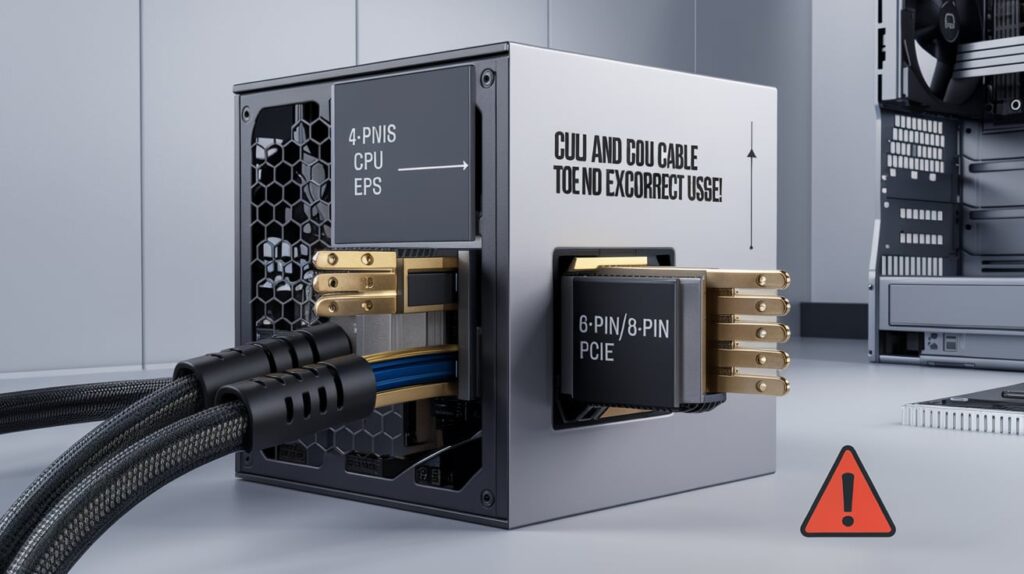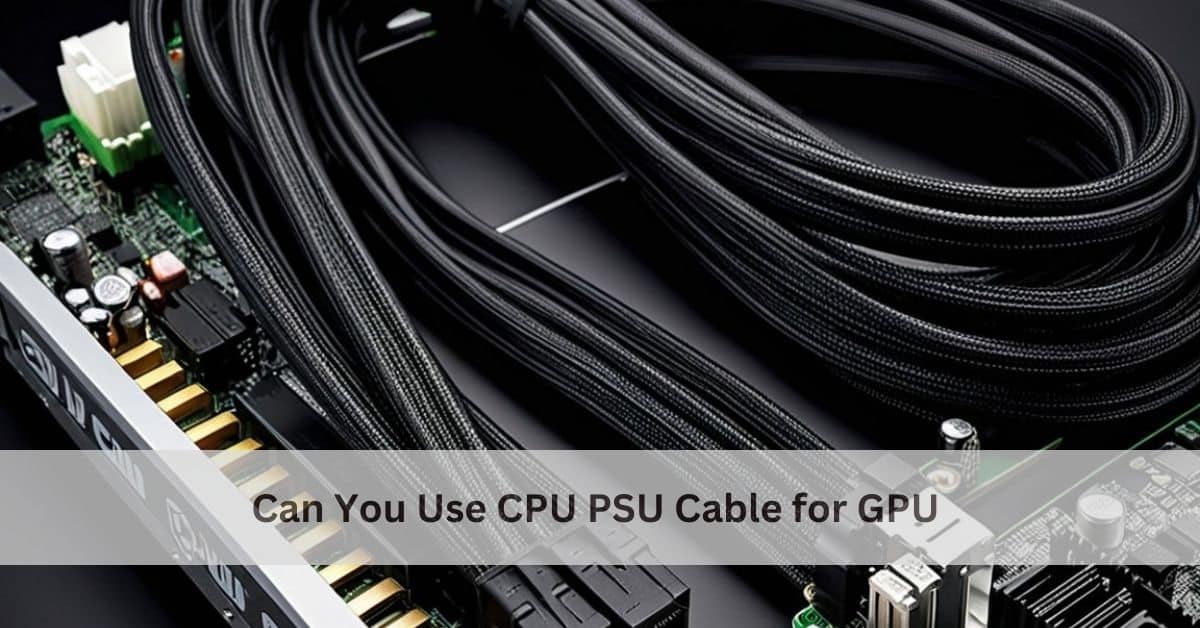I once tried using a CPU PSU cable for my GPU and learned the hard way that it’s not safe. The cables are wired differently, and using the wrong one can damage your GPU or motherboard. Always use the correct GPU cable to avoid costly mistakes!
A CPU PSU cable cannot safely be used for a GPU because their power requirements and connector types are different. Always use the correct PSU cables designed for your GPU to prevent damage.
What Happens If You Use a CPU PSU Cable for GPU?
Using a CPU PSU cable for your GPU can cause serious damage to your components. The wiring and pin configurations are different, and forcing a mismatch can lead to short circuits or hardware failure.
Is a CPU PSU Cable Compatible with a GPU?

No, CPU PSU cables are not compatible with GPUs. They are designed for different purposes and have distinct wiring setups, even if they look similar.
Can Using a CPU PSU Cable Damage Your GPU?
Yes, using a CPU PSU cable for your GPU can damage your GPU and potentially your motherboard. Incorrect wiring can overload circuits or supply the wrong voltage.
Can You Use CPU Power Cables for GPU?
No, you cannot safely use CPU power cables for GPUs. Always use dedicated GPU power cables that match your power supply unit and GPU requirements.
Read More: Is Anti Aliasing Cpu Or Gpu – Find Out!
Are CPU and GPU PSU Cables the Same?
No, CPU and GPU PSU cables are not the same. CPU cables are designed for powering the processor and usually have 4 or 8 pins. GPU cables are designed for graphics cards and typically have 6 or 8 pins, or sometimes both.
Is the CPU 8 Pin the Same as the GPU 8 Pin?
The CPU 8-pin and GPU 8-pin connectors may look similar, but they are different. The CPU 8-pin powers the processor, while the GPU 8-pin powers the graphics card. They are not interchangeable due to differences in wiring and function. Always use the correct connector.
Can I Use a PCIe Cable for a GPU?
No, you cannot use a regular PCIe cable for a GPU. A GPU needs a PCIe slot on the motherboard, not just a cable. The cable is used for power, while the GPU must connect directly to the motherboard’s PCIe slot.
Why Are CPU and GPU PSU Cables Different?

CPU and GPU PSU cables are different because they have different power needs. CPU cables are designed for lower power, while GPU cables carry more power for the graphics card. The connectors and wire thickness differ to meet these needs safely.
Purpose and Power Requirements:
CPU Cables: Designed to provide power specifically to the CPU socket on the motherboard. CPUs require stable, lower power.
GPU Cables: Provide power directly to high-performance GPUs, which require higher wattage, especially for gaming or rendering.
Read More: Is 90 Degrees Celsius Hot for a CPU? Fix Overheating Issues!
Connector Types:
CPU Cables: Use EPS connectors (e.g., 4-pin, 8-pin) that only fit into the CPU power slot on the motherboard.
GPU Cables: Use PCIe connectors (6-pin, 8-pin, or 12-pin) to accommodate higher current requirements of graphics cards.
Voltage and Pin Layout:
CPU Cables: Deliver lower current and stable voltage for the CPU.
GPU Cables: Deliver higher current to meet the power demands of GPUs.
Safety and Compatibility:
CPU Cables: Have different connector shapes to prevent accidental misuse with GPUs.
GPU Cables: Are keyed to ensure they cannot fit into CPU slots.
Modularity in PSU Design:
CPU Cables: Often permanently attached to the PSU in non-modular designs.
GPU Cables: Are detachable in modular PSUs, allowing flexibility for different GPU setups.
How Do You Identify a GPU PSU Cable?
A GPU PSU cable connects the power supply unit (PSU) to the graphics card. It is usually a thicker cable with 6-pin or 8-pin connectors designed for the GPU, distinguishing it from standard power cables.
What’s the Risk of Mixing CPU and GPU PSU Cables?
- Hardware Damage: Mixing CPU and GPU cables can cause hardware failure, including permanent damage to your motherboard, CPU, GPU, or PSU.
- Short-Circuiting: Mismatched pin configurations can lead to short circuits, damaging sensitive components and causing system instability.
- Electrical Risks: Incorrect power delivery can result in voltage issues, leading to permanent damage to your devices.
Can I Use an 8-Pin CPU Cable for a GPU?
- No, It’s Not Safe: Even though an 8-pin CPU cable may look similar to a GPU cable, their internal wiring and purposes are different.
- Voltage Mismatch: The 8-pin CPU cable provides power at a different voltage and current level compared to a GPU’s requirements. Using it can cause serious damage.
Can You Use an 8-Pin CPU Cable for a GPU?
- No, It’s Not Recommended: Using an 8-pin CPU cable for a GPU can cause dangerous voltage mismatches.
- Risk to GPU and Other Components: Incorrect power can damage your GPU, PSU, or motherboard, leading to costly repairs. Always use the correct cables for each component.
How to Correctly Connect PSU Cables and Power a GPU?
- Identify the PCIe cable labeled for GPU use.
- Match the cable’s pins to the GPU’s power connectors.
- Securely plug in the cables without forcing them.
- Double-check all connections before powering on your PC.
Are CPU and GPU PSU Connectors Interchangeable?
- No, They Are Not Interchangeable: CPU and GPU PSU connectors are designed for specific power delivery.
- Risk of Damage: Using the wrong connector can lead to serious damage to components. Always ensure you are using the correct cable for each specific purpose.
Read More: Is 100c Too Hot For Cpu – Here’s What You Need To
Can You Modify a CPU PSU Cable for GPU Use?

- Not Recommended: Modifying a CPU PSU cable to use for a GPU is dangerous.
- Safety Risks: Such modifications can lead to improper power delivery, overheating, or short-circuiting, which could damage your hardware.
What’s the Proper PSU Cable for a GPU?
- Use PCIe Cables: The proper PSU cable for a GPU is a PCIe cable, typically with 6-pin, 8-pin, or 6+2 pin connectors.
- Match Power Requirements: Ensure the cable matches your GPU’s specific power needs to prevent voltage issues and ensure optimal performance.
FAQs:
1: Can I Use an Adapter to Connect CPU Cables to GPU?
Using an adapter is not recommended as it can still cause compatibility issues or insufficient power delivery.
2: How Do I Know If My PSU Cables Are Compatible?
Check the labeling on the cables and consult your PSU manual to ensure compatibility with your components.
3: What Happens If the GPU Doesn’t Get Enough Power?
Insufficient power can cause your GPU to underperform, crash, or even sustain permanent damage.
4: Are Modular PSU Cables Universal?
No, modular PSU cables are not universal. Always use the cables that come with your PSU to avoid compatibility issues.
5: How Many Power Connectors Does a GPU Need?
This depends on the GPU model. Some require one 8-pin connector, while others need multiple 6-pin or 8-pin connectors.
Conclusion:
Using the correct PSU cables for your components is essential for system stability and safety. CPU and GPU PSU cables are designed for different tasks and are not interchangeable. Mixing or modifying cables can lead to hardware damage or power issues. Always refer to your PSU manual and ensure proper connections to avoid costly mistakes. Prioritizing the right cables ensures your PC runs smoothly and efficiently.
